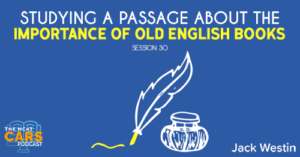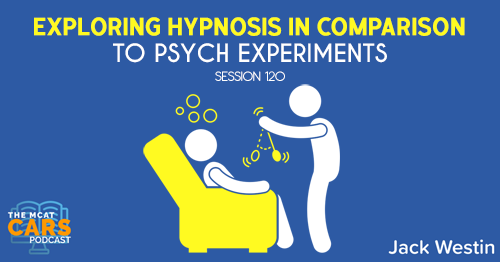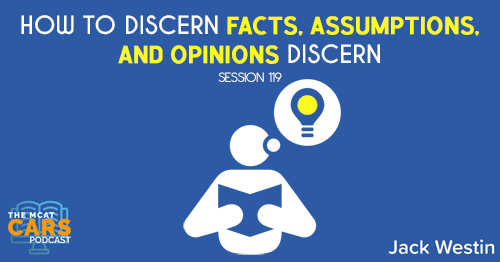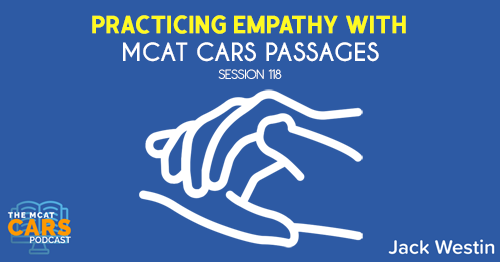Apple Podcasts | Google Podcasts

Session 30
This week, we tackle old books and what’s great about them. We’re joined by Jack from JackWestin.com, the best CARS tutor out there. If you’re struggling with the CARS section, text MCATCARS to 44222. You will then be given a link to Jack’s site that will activate a coupon worth $100 off his course.
[03:00] Tips in Tackling Boring Passages
Jack says you should try to find interest in everything you read. In this case, tackle your weakness. If you’re weak in a certain topic, read more on those. It’s not necessarily that your interest is low, it’s that you’re not familiar with the topic. And that causes you to shut down that part of your brain that wants to learn about it because you’re under pressure. You just have to stretch yourself to understand it a little bit more.
'The different topics are potentially written differently... and if we're not used to reading that, it hurts our brain.'Click To TweetLink to article:
https://newrepublic.com/article/152111/oldest-books-say-us
There are four original manuscripts containing poetry in Old English—the now-defunct language of the medieval Anglo-Saxons—that have survived to the present day. No more, no less. They are: the Vercelli Book, which contains six poems, including the hallucinatory “Dream of the Rood”; the Junius Manuscript, which comprises four long religious poems; the Exeter Book, crammed with riddles and elegies; and the Beowulf Manuscript, whose name says it all. There is no way of knowing how many more poetic codices (the special term for these books) might have existed once upon a time, but have since been destroyed.
Until last week, I had seen two of these manuscripts in person and turned the pages of one. But then I visited “Anglo-Saxon Kingdoms: Art, Word, War,” a new show of artifacts at the British Library in London. It’s a vast exhibition, covering the art, literature, and history of the people whose kingdoms spread across Britain between the sixth and the eleventh centuries. The impetus for the show came from the library’s 2012 acquisition of the St Cuthbert Gospel, the “earliest intact European book,” in the words of the show’s catalog.
Seeing the earliest European book alone would be the event of a lifetime, for a certain kind of museum-goer. But for this viewer, the main attraction lay in a quiet little vitrine: all four Old English poetic codices, side by side. They don’t look that impressive to the casual eye. The exhibition room is dark and cold, to keep the books safe from damage. The manuscripts are brown, small, almost self-effacing. There’s no outward sign of how important they are, how unprecedented their meeting.
So why are these four books so special? It has to do, I think, with the concept of the original—a concept we have almost entirely lost touch with. The Beowulf Manuscript is not just composed of words that serve as the basis for every translation of the epic poem. It’s foremost an object, the only one of its kind. It is not merely a representation of a story; it is the story. In this respect, the manuscript resembles the Crown Jewels more than any document written in today’s world, any word that moves through the crazy fractal of the internet. The manuscripts confront us with a former version of our literary selves; identities that we barely recognize, and which estrange us from ourselves.
Each of the poetic codices has a specific history engraved into the text’s physical form. The very space they occupy on earth is meaningful. The Vercelli Book is named for Vercelli, a town in Northern Italy whose cathedral library holds the manuscript. Nobody knows for sure how the book got there, although the prevailing theory is that a pilgrim left it behind or gave it away on his travels. Who? Why? When? Unknown.
[06:08] Paragraph 1, Sentences 1-2
There are four original manuscripts containing poetry in Old English—the now-defunct language of the medieval Anglo-Saxons—that have survived to the present day. No more, no less.
Jack says:
The author is setting the big picture here that there are four books or manuscripts that contain poetry. Defunct means it’s not around.
[07:08] Paragraph 1, Sentence 3
They are: the Vercelli Book, which contains six poems, including the hallucinatory “Dream of the Rood”; the Junius Manuscript, which comprises four long religious poems; the Exeter Book, crammed with riddles and elegies; and the Beowulf Manuscript, whose name says it all.
Jack says:
The four different manuscripts have been enumerated here.
[07:45] Paragraph 1, Sentence 4
There is no way of knowing how many more poetic codices (the special term for these books) might have existed once upon a time, but have since been destroyed.
Jack says:
The author is saying that there may have been more, but we only have the four now. You don’t have to write down each book. Just know there are books and they’re old.
[09:23] Paragraph 2, Sentence 1
Until last week, I had seen two of these manuscripts in person and turned the pages of one.
Jack says:
The author says he had seen two of them and even touched one of them.
[09:42] Paragraph 2, Sentence 2
But then I visited “Anglo-Saxon Kingdoms: Art, Word, War,” a new show of artifacts at the British Library in London.
Jack says:
The author says they visited this show that had artifacts in London.
[10:01] Paragraph 2, Sentence 3
It’s a vast exhibition, covering the art, literature, and history of the people whose kingdoms spread across Britain between the sixth and the eleventh centuries.
Jack says:
They’re just defining what the exhibit is.
[10:17] Paragraph 2, Sentence 4
The impetus for the show came from the library’s 2012 acquisition of the St Cuthbert Gospel, the “earliest intact European book,” in the words of the show’s catalog.
Jack says:
They’re giving a specific example of this earliest intact European book as to why this exhibit existed.
[11:18] Paragraph 3, Sentence 1
Seeing the earliest European book alone would be the event of a lifetime, for a certain kind of museum-goer.
Jack says:
The author is saying the book is awesome if this is something you’re really into.
[11:32] Paragraph 3, Sentence 2
But for this viewer, the main attraction lay in a quiet little vitrine: all four Old English poetic codices, side by side.
Jack says:
The author says they were there for those four English books that were all there.
[11:54] Paragraph 3, Sentence 3
They don’t look that impressive to the casual eye.
Jack says:
The author is just making a description of the books.
[12:00] Paragraph 3, Sentence 4
The exhibition room is dark and cold, to keep the books safe from damage.
Jack says:
They’re describing the room and why it was that way.
[12:11] Paragraph 3, Sentence 5
The manuscripts are brown, small, almost self-effacing.
Jack says:
“Self-effacing” means being humble but you don’t really need to know this. But they’re describing that the books are small and not really ornamental books.
[12:44] Paragraph 3, Sentence 6
There’s no outward sign of how important they are, how unprecedented their meeting.
Jack says:
The author is saying why they went to see these books and describing them. It’s not the fact that they’re just there. But because they’re all there together. That’s the important thing. And that’s why the author thinks it’s monumental and unprecedented. It has never been done before.
[13:51] Paragraph 4, Sentences 1-2
So why are these four books so special? It has to do, I think, with the concept of the original—a concept we have almost entirely lost touch with.
Jack says:
The author is explaining why they’re special and it’s because they’re original and maybe the first of their kind.
[14:31] Paragraph 4, Sentence 3
The Beowulf Manuscript is not just composed of words that serve as the basis for every translation of the epic poem.
Jack says:
The author is saying that at least the Beowulf manuscript is not just the words, but there’s more to it.
[14:52] Paragraph 4, Sentence 4
It’s foremost an object, the only one of its kind.
Jack says:
The author says it’s unique. It’s original. It’s more than just a book. It’s one of a kind.
[15:20] Paragraph 4, Sentence 5
It is not merely a representation of a story; it is the story.
Jack says:
The Beowulf story is not the story here. But it’s the fact that this book has survived and that is the story.
[15:45] Paragraph 4, Sentence 6
In this respect, the manuscript resembles the Crown Jewels more than any document written in today’s world, any word that moves through the crazy fractal of the internet.
Jack says:
The author is in awe of how these four books have survived, more than just the stories they tell. But the fact this books has survived for so long is the important thing.
[16:18] Paragraph 4, Sentence 7
The manuscripts confront us with a former version of our literary selves; identities that we barely recognize, and which estrange us from ourselves.
Jack says:
These books were written by people a long time ago and people whom we barely recognize. The fact that they’re the first of their kind, or maybe the only of their kind. So this is the point the author is trying to get at. The books are important because of the originality.
[17:05] Paragraph 5, Sentence 1
Each of the poetic codices has a specific history engraved into the text’s physical form.
Jack says:
The author is now talking about the story itself.
[17:24] Paragraph 5, Sentence 2
The very space they occupy on earth is meaningful.
Jack says:
The author is talking about the book, but not necessarily the words.
[17:34] Paragraph 5, Sentence 3
The Vercelli Book is named for Vercelli, a town in Northern Italy whose cathedral library holds the manuscript.
Jack says:
The author is describing how the book was named.
[17:48] Paragraph 5, Sentence 4
Nobody knows for sure how the book got there, although the prevailing theory is that a pilgrim left it behind or gave it away on his travels. Who? Why? When? Unknown.
Jack says:
The author is explaining the book’s history.
[18:10] The Big Picture
The author seems to be in awe of the history of these books and their story, more than the actual story inside the books. What the books contain is not important, but it’s the process of them existing is what’s important. So it’s the originality of it.
Students could get thrown off here and get confused whether the author is talking about the book itself or not. So just slow down so you can really understand. The MCAT is going to bring up something that you may be familiar with. But they’re going to bring it up in a way you never thought about.
'Understand that the author may be talking about something different than how you may be thinking he or she is talking about it.'Click To TweetThe key is are you going to catch that bigger point that they care about? That unique point of perspective from the author. Are you willing to not give up? How focused can you be? Can you really focus on reading carefully and not giving up and worrying about every little detail that you read?
A tricky answer choice that could come up here would be that the story in the book was one of a kind. But it’s not that. It’s the book in and of itself that’s one of a kind.
Links:
Link to article:
SEARCH SITE
SEARCH SITE
LISTEN FOR FREE











